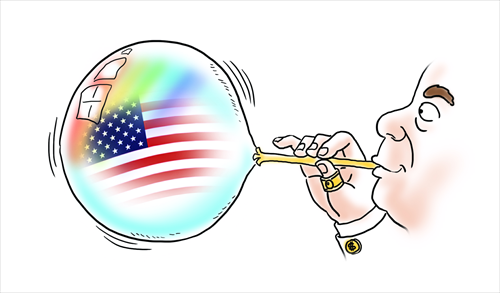HOME >> OP-ED
Chinese riding hot wave of US trends
By Rong Xiaoqing Source:Global Times Published: 2016-1-21 23:13:01

Illustration: Liu Rui/GT
Two days before Christmas last year, I got a WeChat message from a friend in China. "Take a look at this picture," he said. "Can you tell me whether it is true that this is the most popular drink in the US now?"
The picture he sent over was of three plastic bottles in a row, and didn't look much different from any other for mineral water. But it's clear what's inside is not regular water because it casts a dark hue on the transparent icy blue bottles, and makes the white brand logo "blk" Stand out more.
Did I ever see this stuff in real life? If I did, they must have not left any special impression, just like any other H2O based liquid in the crowded beverage row in the supermarket.
"No, I don't think it is that popular. At least I've never heard of it," I told the friend. He seemed relieved. "Thanks for helping me to save money," he said. "My son begged me to buy it for him and said the Americans all drink this. I knew it was a commercial trap."
However, my assertion was shown to be misleading that same night when I turned on TV, and saw a program presenter introducing this product as one of the top 10 lifestyle trends in the passing year. Not the coming year, note, but the passing year - 2015. Then I discovered that it has been around and promoted, such as by being placed in an Emmy Awards gift bag for the stars in 2011, for some time.
The drink, known as black water, is a Canadian brand of mineral water infused with fulvic and humic acids, which give it its color and supposed health benefits. The product is still picking up traction in the US and worldwide. Last year, Cosmopolitan featured the water, the Guardian listed it in their "Six of The Strangest Waters" list, and even Style.com's Arabian edition called it "a new celebrity obsession."
Well, all right, it seemed like I have missed a chance to build a reputation for myself as a lifestyle expert. Not a big deal. But I suspect my friend was sent by some mystic superpower with a more important message.
This was not the first time I was beaten by someone in China in a quiz about ongoing US pop culture in recent years. In 2013, an editor in China asked me to write about the "Hathahaters." That was when I learned about the rising bashing online of movie star Anne Hathaway. Later that year, a friend in China asked me about Carmen Dell'Orefice. That was the time I first heard the name of the octogenarian supermodel, at the age of 84, perhaps the world's oldest working model - and learned her stardom was rapidly rising.
The embarrassments have come in waves since then. Every now and then, someone in China, a friend, a relative or an acquaintance on WeChat would pop up to remind me that I missed the latest episode of Game of Thrones, didn't know the characters in the latest Star Wars movie, or was unaware of a certain glutton free diet that is supposed to be popular among trendy young Americans.
It may not sound so surprising if you consider that American and Western culture, starting with jeans, Coca-Cola, McDonald's and US and English rock bands, has often been of fascination to the Chinese and others around the world. But until very recently, and the speed of the information age, admirers in China had never been able to ride the tides at the same time as the American trend makers.
And it isn't just a question of following the trends but getting in on the ground floor and helping to drive them from an early stage. When I checked Hand to God, a new Broadway show I was interested in seeing last spring I found the Shanghai-based China Media Capital was an investor, and when I went to see Joel Edgerton's psychological thriller The Gift last summer I found China's Huayi Brothers listed as a distributor.
This was illustrated one more time in the recent Powerball craze. When the prize money in the US Powerball lottery game accumulated to $1.58 billion earlier this month, many Chinese jumped on the bandwagon by asking their friends in the US to buy tickets for them. This didn't create any new millionaires in China as far as we know; the winners that have emerged so far are Americans. But it certainly caught a lot of attention of the media here.
I was thinking about writing a piece for a Chinese publication about the Chinese participation in the lottery, but I gave up. As a person who has never dreamed of hitting the jackpot, I don't even know how to scratch the ticket. I am really not confident to tell this story to the real experts, many of whom I am sure are among readers of this article.
The author is a New York-based journalist. rong_xiaoqing@hotmail.com
Posted in: Viewpoint